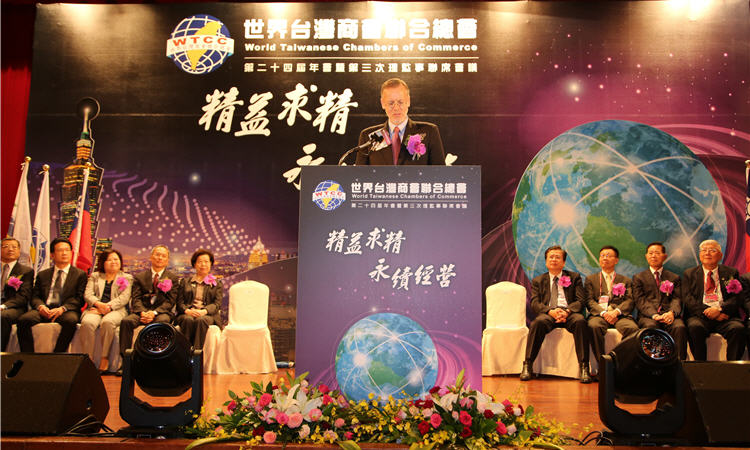September 25, 2018
AIT Official Text #: OT-1827
(As Prepared for Delivery)
President Tsai, President Chang, Commissioner Wu, Deputy Minister Hsieh, Legislator Lin, Mr. Nguyen, WTCC Chairwoman Lin, distinguished members of the WTCC, ladies and gentlemen…
I appreciate the opportunity to be here this morning. This annual gathering shows the breadth and reach of Taiwan’s business connections throughout the world. In fact, I was pleased to meet K.C. Liao, the President of the Taiwan Chamber of Commerce of Greater Salt Lake City, Utah – my home state — when Utah’s Governor Gary Herbert visited Taiwan last week.
In the years ahead, as business relationships evolve in the Indo-Pacific region, I believe the role and importance of Taiwan businesses will continue to grow and expand around the world.
The United States has a clear vision for a free and open Indo-Pacific. “Free” means economies should be free from outside coercion. “Open” means we should all adhere to market economy principles. This is what the United States stands for in the Indo-Pacific.
These are values we share with Taiwan. As Secretary Pompeo pointed out, Taiwan’s economic development went hand-in-hand with creating an open, democratic society. We are looking to work more closely with Taiwan on the Indo-Pacific Strategy’s priority initiatives of energy, infrastructure, and the digital economy.
As part of the Indo-Pacific strategy we seek to build closer business-to-business relations with our partner economies, including Taiwan. We also see great potential for the U.S. and Taiwan to deepen ties with our other partners in South Asia, Southeast Asia, and in Oceania — all places where WTCC has member chambers. As new trade flows develop, members of WTCC chapters will be at the forefront of changing global supply chains.
We must work together to foster a free and open Indo-Pacific that adheres to high standards of commercial engagement and promotes private sector-led growth. The U.S. private sector is the leader of our international economic engagement, and the U.S. government contributes by working with partners to ensure there are open investment environments that expand opportunities for cooperation.
The United States is committed to open markets and free trade in the Indo-Pacific and globally. We must defend the international rules-based order, and sometimes take steps to dissuade those who flout global rules.
For example, China is aggressively using market-distorting subsidies and other practices, including intellectual property theft and forced technology transfers, to capture traditional and emerging technology industries. These actions are harming the United States’ economy, Taiwan’s economy, and other economies.
As part of the Indo-Pacific Strategy, the United States is promoting business opportunities for our firms in the region through three separate programs run by the U.S. Department of Commerce. The first of these programs is “Discover Global Markets,” or DGM, the U.S. Department of Commerce’s premier, flagship once-a-year event that seeks to match U.S. exporters with foreign buyers and opportunities in the United States. This year the DGM will occur in Salt Lake City, Utah. AIT will escort a delegation of Taiwan companies to the Indo-Pacific Discover Global Markets event on Aerospace, Defense and Advanced Manufacturing on December 10-12, 2018.
The second program, “Access Asia,” is a series of 25 events promoting business opportunities in the healthcare, energy, aerospace, and advanced manufacturing industries.
In early February, U.S. exporters of aerospace and defense equipment will gather in Louisville, KY and Dayton, OH to learn about investment opportunities in Taiwan and other Indo-Pacific markets. We expect Taiwan to be well represented at both events.
Finally, in the spring of 2019, the Department of Commerce will hold “Trade Winds: India”. At this event, U.S. exporters will travel to India and other Indo-Pacific markets to meet directly with foreign buyers. AIT will also participate in this event, and we hope to welcome many U.S. companies to Taiwan at that time.
In sum, our focus is three-fold: defending the global trading system, seeking to make business connections between the United States and Indo-Pacific economies, including Taiwan; and encouraging investment flows between our two economies.
In closing, I would like to thank the TCCNA, which helped promote the 2018 SelectUSA Summit last June, where Taiwan’s delegation of 125 companies seeking investment opportunities in the United States was the largest delegation at the summit. With this high level of interest from Taiwan firms in investing in the United States, I am confident that WTCC chapters in the United States will continue to expand and to deepen the positive economic linkages between our two economies.
Thank you.
















![Video Thumbnail [Recovered]-01](../wp-content/uploads/sites/269/Video-Thumbnail-Recovered-01-1-750x450.jpg)




